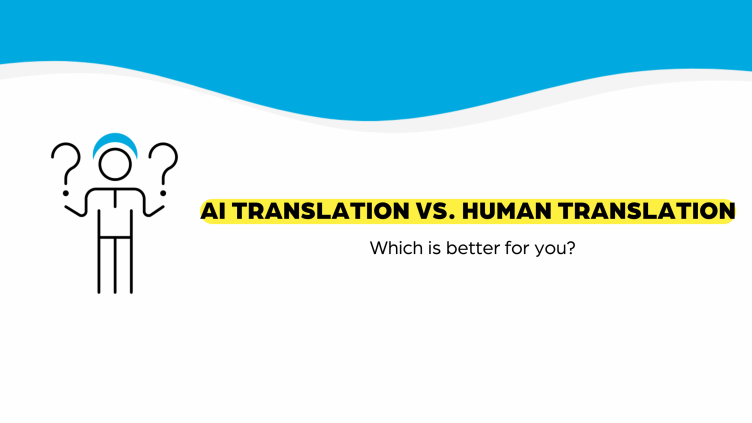AI Translation Vs Human Translation: Which Is The Best?

Translation has become an essential aspect of communication in today’s globalized world. Businesses, organizations, and individuals must translate content into multiple languages to reach a wider audience due to the many languages spoken worldwide. However, whether you should use AI Translation vs human translation for your translation needs remains.
Artificial intelligence (AI) has created significant advances in the field of translation, providing advanced translation technologies that can translate text from one language to another quickly and accurately. However, human translators remain the gold standard for high-quality, nuanced translations. In this blog post, we will discover the benefits and drawbacks of AI and human translation to assist you in deciding which option is best for your translation needs.
Human Translation – Overview
Human translation, also known as HT, is a process of translating any kind of text with the help of a professional human translator. While human translation comes in various flavours, it is still the most commonly used translation method today.
Like AI-based translation, human translation also comes with several pros and a few cons. You will get details on it in the next section.
Pros Of Human Translation
The reason behind the success rate of human translation company is their benefits or pros, that is listed below:
Most accurate translation
– the first pro of human translation is that it provides accurate translation of your content. A human translator would quickly associate the word with its context, whereas a machine may only provide an awkward translation.
Creativity
– human translators translate your text in a creative way which an AI tool cannot do. When a precise translation is impossible, the human translator must use imagination to find the best expression to convey the intended meaning.
Cultural knowledge
– cultural knowledge is a powerful key in translation because it helps a reader to stick with the content. A human translator can modify a translation to ensure it is culturally sensitive and appropriate for the document’s target audience. AI software cannot do this.
Knowledge of a sector
– A sector-specific specialist can be dedicated to working on a translation project using human translation, ensuring that each concept is accurately translated. Unlike AI tools, human translators have the expertise and knowledge to achieve this level of accuracy.
Cons of Human Translation
Yes, human translation comes with the following cons-
Slow translation
– you might be familiar with the phrase ‘good things take time’. Similarly, the first cons of human-based translation are that the translation process is comparatively slower than AI.
Human error
– It is a universal truth that humans make mistakes. That is why you might receive a translation from a human with a few mistakes. But these mistakes can be solved after discussion.
AI Translation – Overview
AI translation, sometimes known as MT or machine translation, is the process of translating anything using a machine or artificial intelligence based on complex learning. A deep AI translator, or deep learning, uses a system of neural networks inspired by the workings of the human brain to understand the source and linguistically construct sentences in another language.
There are several online translator tools that have entered the translation market. For example, in online tools like Google Translate, AI translation is based on Neural Machine Translation (NMT). These automated translation systems are imperfect, but NMT is improving over time.
We hope that you have now understood the basic of AI translation. It has several pros and cons. So let us understand the pros of AI translation.
Pros of AI Translation
AI translation, which uses machine learning algorithms and natural language processing to translate text from one language to another, has several benefits. The AI-powered translation is becoming popular day by day. The following are the pros of AI translation.:
Consistency
– the first benefit of AI translation is that it can deliver a high level of consistency. This is especially useful for technical, legal, and other types of content requiring precise and consistent language.
Time-saving
– When you don’t use humans to unearth the elements of the more creative messaging you create, your costs stay low. AI translation is also time-saving because it can translate faster than humans.
Cost-effective
– AI translation is also cost-effective means the cost of using an AI translation service or tool is still lower than hiring a human translator.
Cons of AI Translation
While AI translation can be a valuable tool, it is critical to understand its limitations and the risks associated with its use. The following are the cons of using AI translation tools:
Accuracy risk
– Indeed, AI translations are becoming famous, and most internet users have started using these tools. But still, they need to be more reliable and accurate in translating content. It’s still 60-90% accurate. As a result, given the vulnerability of machine translation to mistranslations, one should not rely solely on it.
Initial time cost
– An AI-based program must be trained with a large amount of data to produce high-quality results.
Reliability on humans
– AI cannot compete with humans in translating dynamic, impactful, and persuasive texts.
Security and privacy risk
– Yes, AI translation also comes with data security risks. Free AI-based translators will not likely comply with the highest data privacy standards.
Indeed, AI translation has more disadvantages than advantages. But what about a human-based translation? Is it better than AI translation? We will answer all of your questions in the next section.
AI Translation Vs Human Translation: Which Is The Best Option?
AI-based translation is the best for small text translation. Machine or AI translation can be a quick and effective tool, but it is not viable for businesses looking to make an excellent first impression. So, AI-based translation is not the ideal solution for professional translation because AI translations are impractical in some industries. Medical guidelines, legal documents, and user manuals all require the expertise of linguists who are well-versed in translation best practices.
Conclusion
AI Translation vs human translation have advantages and disadvantages; the choice ultimately comes down to your specific translation requirements. AI translation Services is quick and inexpensive for simple translations, but it may need help with complex sentence structures, cultural nuances, and idiomatic expressions. Human translation, on the other hand, provides greater accuracy, context, and cultural understanding than AI translation. We at Linguidoor, provide machine translation with post editing as well as human translation depending on the requirement of the project. Consult with us today to understand the process and different between Ai Translation Vs Human Translation and let us help you move towards the right direction.

Made up your mind yet?
Empower your globalization goals today!




